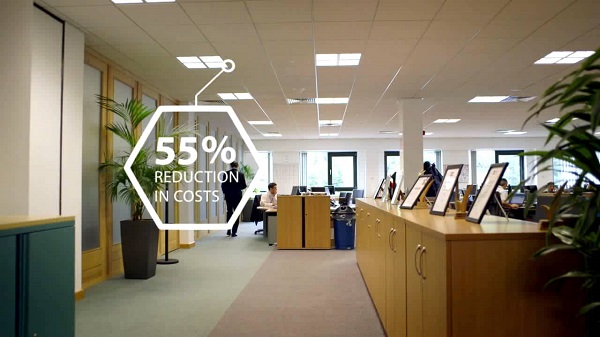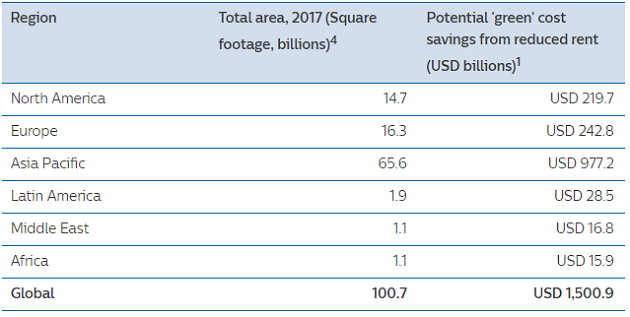Businesses around the world could realize savings of up to USD 1.5 trillion in reduced rental costs alone if their office buildings were refurbished to the most efficient standards of today, according to a new analysis from Philips Lighting.
The findings, released by Philips Lighting in conjunction with World Green Building Week, show the impact that could be made on rents across the world’s offices if business owners replicated the efficient usage of space achieved in a leading green building. Deloitte accomplished a 50% reduction in space required per employee in The Edge building in Amsterdam compared to its previous premises The Chrystal Tower, through effective use of smart technology.
The Edge uses smart technology such as a connected LED lighting system from Philips Lighting that enables employees to personalize their lighting and temperature at their workspaces via a smartphone app, but also provides building managers with real-time insights on how the office is being used to help maximize operational efficiency. These insights are derived by the analysis of data collected by sensors embedded in the lighting.
Philips Lighting is calling for a doubling of the renovation rate of offices in developed countries to reach 3% per year, which it says will be a key factor in reducing emissions and offsetting increased demand for energy from population growth and urbanization.
Moreover, the research findings highlight that in addition to reducing their carbon footprint, office tenants could see vast financial savings if their buildings were renovated in a way that uses space more effectively, particularly in buildings with a high number of empty workspaces and meeting rooms at any given time.
But Philips Lighting says the potential rent reduction from optimizing offices is just a small proportion of the total potential financial benefit to businesses, which also includes lower utility bills and significant gains in the productivity of employees, the largest cost to most businesses.
 |
|
(Image: Philips Lighting) |
“Renovating buildings to make them more energy efficient can have a huge beneficial impact on the environment, and when they are renovated properly to encompass smart technology, the additional financial impact for businesses can also be vast,” explained Harry Verhaar, Head of Global Public & Government Affairs at Philips Lighting.
The JLL 3-30-300 rule of real estate shows that a company’s typical costs per square foot per year are USD 3 for utilities, USD 30 for rent and USD 300 for payroll, highlighting that gains in employee productivity are worth far more to a company in financial terms than rent reductions or increases in energy efficiency of the same percentage.
“Our research looks at the potential savings in rent by optimizing space,” Verhaar continued, “whereas this is just scratching the surface of the financial gains that can be simultaneously made by using smart technology. This can significantly reduce bills for energy, water and air conditioning, and generate even greater financial benefits by improving the productivity of employees through enabling them to do things like find a meeting room faster or adapt the light and temperature conditions at their workstation. We are calling for a doubling of the renovation rate of buildings primarily to help mitigate the harmful effects of climate change, but at the same time take advantage of some considerable commercial benefits to businesses.”
Regional reductions
Asia Pacific is the largest market for office space, with a total of over 65 billion square feet of office space. As such, it currently has a potential USD 977 billion of reduced annual rent for commercial tenants if buildings were optimized in line with best practice. This is more than the total economy of Indonesia. Europe has a total of USD 243 billion of potential savings, and North America USD 220 billion.
 |
|
(Source: Philips Lighting) |
World Green Building Week is the flagship event of the global green building movement organized by World Green Building Council and led by its network of over 70 Green Building Councils and their 32,000 member companies.
The event will promote the goal of ensuring that all buildings – both new and existing - are ‘net zero’ by 2050, meaning they are highly energy-efficient buildings which generate or supply the energy they need to operate from renewable sources – like solar energy - to achieve net zero carbon emissions on an annual basis.
“Achieving our net zero goals is entirely possible but in order to do so we really need to step up the rate of renovation”, explained Terri Willis, CEO of World Green Building Council.
“Companies looking to do a major refurbishment should be prepared to layer in energy-efficiency retrofits and implement new technologies. Office optimization also has to be part of green building strategy, from looking at how to improve the usage to space to implementing hot-desking and flexible working spaces. These things all contribute to making buildings greener while bringing many additional benefits for organizations such as reduced energy costs and health and wellbeing benefits for employees.”
Philips Lighting is a member of the Corporate Advisory Board for World Green Building Council.
For information about the analysis can be accessed by clicking here.












